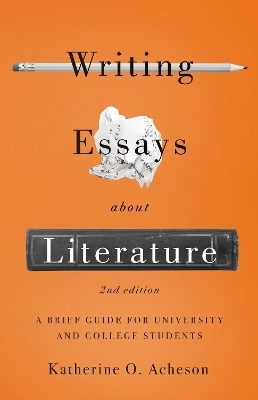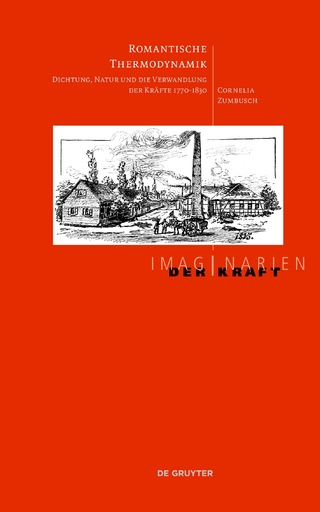
Writing Essays About Literature
Broadview Press Ltd (Verlag)
978-1-55481-551-7 (ISBN)
This book gives students an answer to the question, “What does my professor want from this essay?” Using a single poem by William Carlos Williams as the basis for the process of writing a paper, it walks students through the processes of reading, brainstorming, researching secondary sources, gathering evidence, and composing and editing the paper.
Writing Essays About Literature is designed to strengthen argumentation skills and deepen understanding of the relationships between the reader, the author, the text, and critical interpretations. Its lessons about clarity, precision, and the importance of providing evidence will have wide relevance for student writers. The second edition has been updated throughout and provides three new complete sample essays showing varying approaches to the final essay.
Katherine O. Acheson is Professor of English at the University of Waterloo and the editor of the Broadview Edition of Lady Anne Clifford's Memoir of 1603 and Diary of 1616-19.
Section One: Introduction
Chapter One: The Purpose of an Essay about Literature
Literature: Instruction, Delight, Imitation
The Literary Essay
Evidence
Communication
Subjectivity
How to Use This Book
Review Questions
Section Two: Research and Analysis
Chapter Two: Research within the Text
Taking Notes about Literature
Recording Your Responses to the Text
Do I Like the Work?
What Words Stand Out?
What Feelings Does It Give Me?
Do I Identify with Any of the People Represented?
Is There Anything about How It's Written That Stands Out?
What Is the Work about?
Conclusion
Review Questions
Chapter Three: Using Reference Works
The Oxford English Dictionary
Etymology
Definitions
Examples of Usage
Scholarly Editions
Encyclopedias
Conclusion
Review Questions
Chapter Four: Research about Social and Historical Contexts
Topics for Research: Social Phenomena and Literary Movements
Useful Resources
Using Your Findings
Conclusion
Review Questions
Chapter Five: Research about the Current Critical Assessment of Literary Works
Finding Critical Works
Assessing Publications
Using Bibliographies
Reading Critical Works
Taking Notes from Critical Readings
Conclusion
Review Questions
Chapter Six: Inventing Your Argument
Arranging Your Evidence
Reviewing Your Labeled Evidence
Categorizing Your Evidence
Charting Your Evidence
Conclusion
Review Questions
Section Three: Composition
Chapter Seven: Composing Your Argument
Inductive Reasoning
Composing the Thesis Statement
Writing the Subtopic Sentences
Composing the Body of the Thesis Statement
Composing the Body of the Introduction
Concluding the Introduction
A Variation: An Essay without Secondary Sources
Conclusion
Review Questions
Chapter Eight: Writing the Body of the Essay
The Body Paragraphs
Features of Strong Paragraphs
Writing the Conclusion and Revising the Introduction
The Conclusion
Revising the Introduction
Conclusion
Review Questions
Section Four: Polish and Presentation
Chapter Nine: Editing and Proofreading Your Essay
Conventions of Essay-Writing Style
Diction
Vocabulary
Connecting Words
Common Grammatical Errors
Apostrophes
Demonstrative Pronouns
Pronoun Agreement
Verb Tense
Common Errors in Punctuation and Sentence Structure
Semicolons
Comma Splices
Sentence Fragments
Subordinating Conjunctions
Conjunctive Adverbs
Conclusion
Review Questions
Chapter Ten: Documenting Your Sources and Presenting Your Work
Reasons for Documenting Sources
Documentation Practices
Presenting Your Work
Layout and Order
Illustrations
Multimedia and the Literary Essay
Exemplary Illustrations
Complementary Illustrations
Supplementary Illustrations
Last-Minute Checks
Conclusion
Review Questions
Section Five: Conclusion and Review
Chapter Eleven: The Process of Essay Writing-A Summary
Collecting Evidence (Chapters 2-5)
Categorizing Evidence (Chapter 6)
Writing Your Thesis Statement (Chapter 7)
Troubleshooting the Thesis Statement (Chapter 7)
Writing the Body Paragraphs (Chapter 8)
Concluding Your Essay (Chapter 8)
Proofreading (Chapter 9)
Documentation and Presentation (Chapter 10)
Conclusion
Works Cited
Sample Essay One
Sample Essay Two
Sample Essay Three
Subject Index
| Erscheinungsdatum | 23.03.2021 |
|---|---|
| Verlagsort | Peterborough |
| Sprache | englisch |
| Maße | 140 x 216 mm |
| Gewicht | 275 g |
| Themenwelt | Geisteswissenschaften ► Sprach- / Literaturwissenschaft ► Anglistik / Amerikanistik |
| Geisteswissenschaften ► Sprach- / Literaturwissenschaft ► Germanistik | |
| Geisteswissenschaften ► Sprach- / Literaturwissenschaft ► Literaturwissenschaft | |
| ISBN-10 | 1-55481-551-7 / 1554815517 |
| ISBN-13 | 978-1-55481-551-7 / 9781554815517 |
| Zustand | Neuware |
| Haben Sie eine Frage zum Produkt? |
aus dem Bereich


